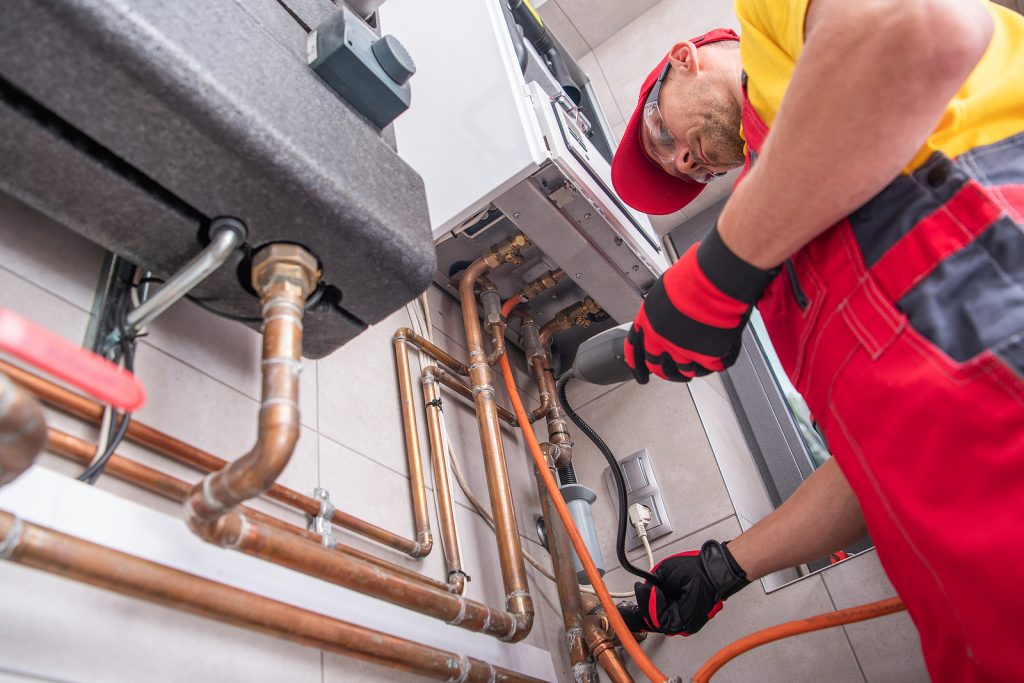Natural gas plays a vital role in powering homes across the United States, from heating water to cooking meals. While it’s generally safe, gas leaks can be dangerous if left undetected. Recognizing the warning signs and knowing how to respond can protect your family and property. Here are five ways to identify a gas leak and steps you can take to ensure your safety.

Common Causes of Gas Leaks
Gas leaks can result from various factors, including wear and tear on gas lines, improper installation of appliances, or external damage. Over time, older gas pipes may corrode, or joints may loosen, allowing gas to escape. Weather events, shifting soil, or home renovations can also damage gas lines, increasing the risk of leaks.
The Risks of Gas Leaks
A gas leak isn’t just inconvenient; it’s a serious hazard. Here are some potential dangers:
- Health Problems: Exposure to gas leaks can cause headaches, nausea, dizziness, or respiratory issues. In severe cases, it can lead to asphyxiation.
- Environmental Damage: Escaping gas can harm plants, grass, and trees near the leak.
- Fire or Explosion: Natural gas is highly flammable. A spark or open flame can ignite gas, leading to devastating fires or explosions.
- Structural Damage: Explosions caused by gas leaks can severely damage homes.
- Higher Utility Bills: A gas leak can result in a noticeable spike in your monthly gas bill.
5 Effective Ways to Detect a Gas Leak
1. Smell for Rotten Eggs
Natural gas is odorless in its raw state, but utility companies add mercaptan, a chemical that gives the gas a strong sulfuric or “rotten egg” smell. If you notice this distinct odor, it’s a clear sign of a potential leak. Avoid using electrical devices or open flames, and evacuate the area immediately.
2. Listen for Hissing or Whistling
A hissing or whistling sound near a gas line or appliance could indicate a gas leak. Check around gas pipes, connections, and appliances. If the sound persists, leave the area and contact a professional.
3. Use the Soapy Water Test
This DIY method is simple and effective:
- Mix water with a few drops of dish soap.
- Apply the solution to areas where you suspect a leak, such as gas line joints or connections.
- If bubbles form, it confirms a gas leak.
This method works well for small, localized leaks.
4. Check Stove Top Flames
When your gas stove is functioning correctly, the flames should burn blue. If you notice yellow or orange flames, it’s a sign of improper combustion, which could be caused by a gas leak.
5. Invest in a Gas Leak Detector
A gas leak detector is a reliable tool for identifying leaks. Here are some types:
- Portable Detectors: Ideal for pinpointing leaks in various areas of your home.
- Plug-In Detectors: These continuously monitor specific locations, such as kitchens or basements.
- Combination Detectors: Detect multiple gases, including carbon monoxide and natural gas, for comprehensive protection.
Steps to Prevent Gas Leaks
Regular maintenance and proper care can reduce the risk of gas leaks. Follow these tips:
- Inspect Appliances: Ensure gas-powered appliances are in good condition and properly installed.
- Replace Old Gas Lines: Consider upgrading older gas pipes that show signs of wear.
- Schedule Professional Inspections: Hire licensed professionals to perform routine checks on gas lines and appliances.
- Be Mindful During Renovations: Avoid accidental damage to gas lines during construction or landscaping projects.
What to Do If You Detect a Gas Leak
If you suspect a gas leak, take immediate action:
- Evacuate the Area: Get everyone out of the house, including pets.
- Avoid Flames and Sparks: Don’t light matches, use lighters, or operate electrical devices.
- Shut Off the Gas: Turn off the main gas valve, located near your gas meter.
- Call for Help: Contact your gas company or a licensed plumber for emergency assistance.
- Stay Safe: Wait for professionals to confirm it’s safe to return before re-entering your home.
Top Gas Leak Detectors for Your Home
Investing in a high-quality gas detector can provide peace of mind. Here are three options to consider:
1. Propane and Natural Gas Detectors
These devices detect leaks in propane and natural gas systems. Options include portable detectors for spot checks and plug-in models for continuous monitoring.
2. Carbon Monoxide Detectors
Although carbon monoxide (CO) is different from natural gas, it’s a byproduct of incomplete combustion in gas appliances. Every home should have a CO detector.
3. Combination Gas Detectors
These versatile devices can identify both combustible gases and carbon monoxide, offering dual protection for your home.
Professional Gas Leak Repairs
While minor leaks can sometimes be addressed with temporary fixes, larger or complex leaks require professional attention. Here’s why hiring an expert matters:
- Licensed plumbers have the tools and expertise to accurately locate leaks.
- Professionals ensure repairs comply with safety standards and regulations.
- They can recommend upgrades or replacements to prevent future issues.
Why Choose Bienvenu Brothers for Gas Leak Detection and Repairs?
At Bienvenu Brothers, your safety is our top priority. With decades of experience, we specialize in detecting and repairing gas leaks quickly and efficiently. Our licensed plumbers are equipped to handle everything from small leaks to major repairs, ensuring your home is safe and secure.
Call us today at (504) 835-7783 to schedule an inspection or repair. Don’t wait until it’s too late—let Bienvenu Brothers protect your home and family.

